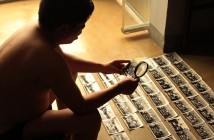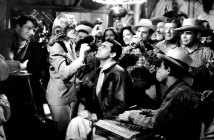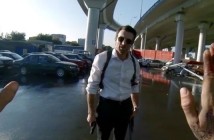
Shot in twenty-one days over a period of two months, Kim Dong-myung’s trenchant directorial debut begins, suitably enough, with a lie: Ah-young is a woman in the middle of inspecting a swanky apartment in an equally swanky high-rise building. Well-dressed and confident, she exudes sophistication through a mix of indifference and curiosity towards the place. As if to confirm this impression, she inquires about even more expensive properties that she could survey. As if to solidify this impression, she abruptly puts an end to the appointment and leaves the premises, presumably in pursuit of more refinement and class elsewhere. However, this incident is just one of Ah-young’s daily routines to help maintain the façade of a privileged lifestyle, professionally and personally. Ah-young is actually a simple cosmetic nurse and her family life is anything but marketable for a single woman: a stout, alcoholic sister; a wayward brother; an estranged mother preoccupied with her own relationship with a man who is not her father; and a father nowhere to be found.

On an individual level, Ah-young’s acute propensity for lying is a mode of escapism and emotional release from her humdrum actuality. In this way, the film is a clinical, frank look at what could be described as the psychic evolution of a liar; or put another way, at the social evolution of lies cultivated by one person and its impact on those whom she knows. But on a socio-psychological level, Ah-young and her lying ultimately build towards a stinging critique of the capitalist culture of accumulation and how it plays into one’s measure and definition of self-worth – particularly in place of absent and/or ruptured familial bonds. On this note, the story could have reduced Ah-young as a metaphor in the service of its critique. But Kim Dong-myung’s writing is more nuanced: the film’s alluring complexity stems from the fact that Ah-young is a multilayered character whose lying is both extraordinary in its frequency and ordinary in the context of a highly urbanised, competitive, technologically advanced, and neoliberal capitalist society. The film is therefore a character study and a critique; or, a critique through a sharp character study. Kim Dong-myung explains, ‘If you look at [Ah-young’s] lifestyle, it looks as if she’s pushing her family away. But she yearns for her family’s love very much. If you connect that to society, you can think of it as her yearning for affection in/from society. In order to receive attention from society, you need ability or wealth. In order to receive society’s attention, she chooses to lie.’ While outwardly petty and commodity-obsessed, the film gradually reveals Ah-young to be a person in turmoil and pain, due to what she thinks she should be according to society, and this turmoil and pain manifest themselves through her inveterate lying to others.
The lies are never unusual or dramatised, however; in fact, they are surprising for their routine quality of aspirations (a posh apartment, a car, even a refrigerator). Kim Dong-myung constructs Ah-young’s character in part through a series of exchanges between Ah-young and service representatives in stores and real estate properties, with the former indulging in the ability to consume commodities but never closing the deal, much to the latter’s chagrin. Initially, Ah-young appears to be perversely content with exercising this ability. Yet as the film reveals her actual financial and familial circumstances, we realise the limits of this ability, making this act tinged with sadomasochistic hues. And so gradually, we also come to realise the gigantic charade that she has been weaving even before the film begins, of which such arrested consumerist exchanges form a part. Another part of this charade concerns lying to her boyfriend/fiancé about her family’s class and background and, in turn, to her work colleagues about her boyfriend/fiancé’s class and background.
Established independent film actress Kim Kkobbi plays the titular liar with remarkable nuance. Surprisingly, Kim Dong-myung relates, ‘we cast her two weeks before [shooting began]. Actually, we had someone else in mind. But after rehearsing with her, we found it might not be a good fit, so we cast Kim. For two weeks we rehearsed [with Kim and the rest of the cast], and with each character.’ Despite the brevity of preparation time, Kim Kkobbi captures the icy fragility of her character with precision, complemented by Kim Dong-myung’s tight framing and handheld/mobile camerawork. Kim Dong-myung initially ‘wanted to use deep focus, [but]in our environment it wasn’t possible because the space was so narrow, so we changed our direction and decided to hold the camera and go close to film the characters.’ The film’s narrow, tight settings and framing actually contribute to the piercing quality of this portrait of a subjectivity without resorting to subjective devices (e.g. voiceover, expository dialogue). Ah-young’s subjectivity is never clearly outlined and this indistinct approach to the character makes more powerful and relatable her lies, not to mention the increasing burden of maintaining them as her truth to the world around her. When a refrigerator that she had teasingly pondered to buy during one of her commodity jaunts arrives at her family’s tiny apartment, on the surface it seems ridiculous that it would turn her charade-life upside-down. But that we believe it attests to both the efficacy of Kim Dong-myung’s writing and Kim Kkobbi’s understated panic. As an object, the refrigerator is a hulking presence in the apartment, therefore registering visually the economic disparity between the object’s monetary value and Ah-young’s financial straits, even mocking Ah-young of this disparity in the face of her ambitions.
Yet a greater testament to Kim Dong-myung’s writing and Kim Kkobbi’’s organic performance is the fact that over the course of the film, Ah-young does not become demonised or made pathological but rather a sympathetic figure. As she finds her lies increasingly tested by her work colleagues and boyfriend, they unwittingly subscribe to the same moneyed fantasies, just in different ways. Her colleagues insist on the right way to give wedding invitations and accept being treated by Ah-young to celebrate her engagement. When she reconciles with her boyfriend to go through with their engagement, she finds him just as bitten by the cult of commodified appearances as she is when he introduces her to his mother; both are aghast at the truths she tells of her life. Ah-young’s workplace alone speaks volumes to the way her sense of self in relation to society is not exactly rare: the cosmetic clinic is always busy; who knows how many of the customers also harbour a similar disposition due to media images and standards of beauty, body size, and a ‘successful’ and ‘complete’ life measured in commodities and not merely spending money but being seen doing so. Kim Dong-myung’s choice of Ah-young’s workplace was thus strategic: ‘At an aesthetic clinic, you’re peeling off your mask. I chose that setting because ironically although Ah-young requires the peeling of her skin the most, she’s actually doing that for other people.’
The film’s unpalatable truths are never hammered into the spectator’s head; they bob up to the surface, hazily and then clearly, purely through Ah-young’s actions and interactions. Spelling them out would have paradoxically gotten in the way of delineating Ah-young’s character and understanding her on a chiefly visceral level and without judgment. On this note, Kim Dong-myung shares that above all she ‘want[ed]to show how the lies keep snowballing through Ah-young’s body. If you look at her from society’s point of view, you can think of lies just walking around. And vanity as well.’ The film’s ambiguous conclusion sees Ah-young stop walking, worn out from her circle of lies, indeed, from the vicious circle of lying and accumulation that is the capitalist credo.



